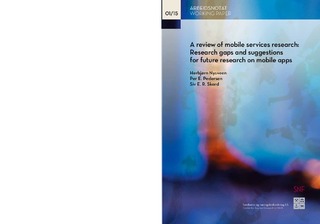| dc.description.abstract | The working paper starts with an overview of the growth in research on mobile services. Based on
the increase in the research on mobile services the last few years, the fact that the last general
review article on mobile services we identified was published in 2010, and the change to more appbased
mobile services, we argue for the importance of conducting a review to identify gaps in the
literature that should be guiding future research on mobile services. The methodology applied to
identify articles for the review is described along with an overview of the journals from which the
articles are selected. The main categorization of the articles includes conceptual, qualitative, and
quantitative contributions.
The analysis starts with a description of the mobile services studied within each of the main
categories of the articles. The analysis shows that articles sometimes operate with rather generic
descriptions of the mobile service category studied – e.g. mobile commerce, mobile marketing,
mobile data services, etc. The next part of the analysis is a review of the main topics studied in the
articles. The conceptual articles typically focus 1) definitions, opportunities and challenges of mobile
services, 2) description of success criteria, 3) implications of mobile services, and 4) description and
discussion of system design and modelling processes. The main focus of the qualitative studies is on
success criteria. Also, a few articles look into issues of business models and system design and
modelling processes. The quantitative studies constitute the largest category of articles. A lot of
these studies look into success criteria – and a large part of this topic is covered by adoption studies
focusing antecedents of successful adoption of various mobile services. It is an interesting
observation that surveys seem to be the dominating methodological design in the quantitative
studies. Based on the review, the main gaps identified are 1) only a few studies look into app-based mobile
services. This seems reasonable as app-based mobile services are a rather novel type of mobile
services, but it is still worrying due to the apparent success of these services. 2) Only a few studies
look into effects of using mobile services, and when compared to the large amount of adoption
studies, this is emphasized as an interesting path for future research. 3) Only a few studies seem to
focus on mobile services developed for specific contexts. A few exceptions are, for example, two
studies investigating in-store mobile services – mobile services tailored to support the shopping
experience in a specific store. We see this as an interesting direction for future research as we also
expect a growth in such types of mobile services in the years to come. 4) We also observe that a
rather small part of the studies are applying experiments as the methodological design. To improve the validity of mobile services research, we argue for the importance of applying more experiment
based research designs. | nb_NO |
